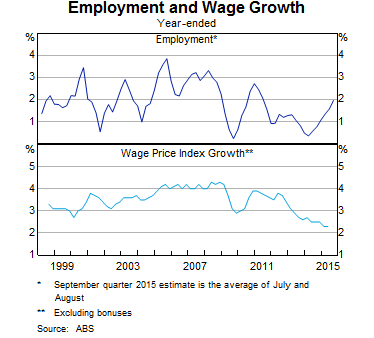If you didn’t know better, you would think the Reserve Bank was trying to make a point about our industrial relations debate (such as it is).
The flexibility of the economy in recent years is of especial interest to the bank, particularly the labour market. Recently, senior bank officials have made a point of how this flexibility that helped the economy through the mining investment boom (avoiding an inflation-driven crash), the downturn in mining investment and the transition in the economy. And this morning deputy governor Philip Lowe was back at it in a fascinating speech that policymakers in Canberra ought to read closely.
Not only did Lowe speak optimistically about the fundamentals of the Australian economy (“My central message is that these fundamentals are strong and that they provide us with the basis to be optimistic about the future”) but he strongly supported the recent draft Productivity Commission report on workplace relations, which has come under attack from business figures for failing to recommend aggressive IR deregulation.
Lowe’s line was the same as we’ve heard previously from the RBA: labour market flexibility has been important in the relative success of the Australian economy in recent years:
“From a macroeconomic point of view, Australia’s labour market arrangements have worked well over recent times. During the global downturn, flexibility in hours worked helped limit the rise in unemployment. Then, during the years of the resources boom, very large wage increases were mainly confined to the areas where skills were in the shortest supply and they did not spread across the economy as a whole. And more recently, the slowing in aggregate wage growth has helped employment to grow reasonably strongly despite below-average growth in the overall economy. So, from a cyclical perspective, the labour market has proved to be quite flexible and things have worked reasonably well.”
Addressing the Productivity Commission’s draft report directly, Lowe noted “it should be possible to simplify and improve the responsiveness of our current system while, at the same time, addressing the sometimes unequal bargaining positions in the labour market”. Tellingly, the immediate reaction was to see this as supporting the PC’s recommendations on penalty rates — that Sunday rates be brought into line with Saturday rates — while ignoring the more substantive parts of his speech on the flexibility of the whole system and how it has been a major support to the economy.
This graph from Lowe’s speech helps explain why the labour market has done better than anyone, including the RBA, thought it would a year ago. The slowdown in the wage price index and the rise in employment has been striking and no one has been able to explain it other than in terms of the flexibility of the labour market — a situation denied or ignored by ideologues in business, the Coalition and the media.
It’s also a pointed rejoinder to the hysterics that greeted Labor’s introduction of the Fair Work Act in 2009 — including from then-opposition leader Malcolm Turnbull — who insisted it would kill jobs and hand too much power to unions.
Lowe also strayed off-piste for a Reserve Bank official, making this observation about the role of education in a flexible economy:
“No matter what the future holds, it seems probable that continual improvement in our human capital will hold us in good stead. But given the unpredictability of the world in which we live, we need to find the right balance between the development of specific technical and professional skills and the general cognitive skills that are central to flexibility and adaptability.”
It’s a reminder of a truth often forgotten in the discussion about the need for “economic reform”. Reform isn’t just fiddling with the tax system, or cutting wages, or privatising assets, or amending competition law. If anything, those are the relatively straightforward policy issues (if not straightforward politically). The really difficult reform challenge relates to “human capital” — how we make the most of our education system to produce high-quality workers, entrepreneurs, scientists and managers. And that extends to how we make sure our health and social care system functions as effectively and efficiently as possible, as well — particularly given the massive role it now plays in the Australian economy. You can bet few media commentators will have noticed this point.








Indeed. But if it’s not arguing against penalty rates I don’t know what this refers to, which appears just before the reference to the Productivity Commission’s report:
‘A more open question is the degree of flexibility in dealing with structural change. Again, we are more likely to be able to capitalise on our strong fundamentals if our system of workplace relations helps businesses and their employees respond quickly and effectively to new opportunities. This is especially so when business models and the preferred working patterns of Australians are changing.’
The problem is that all governments seem to want to revisit policies that don’t work. In the 70s we were told the wealth creators would give us growth if we offered up all public assets. It didn’t work and we have been trying to make it work for 40 years.